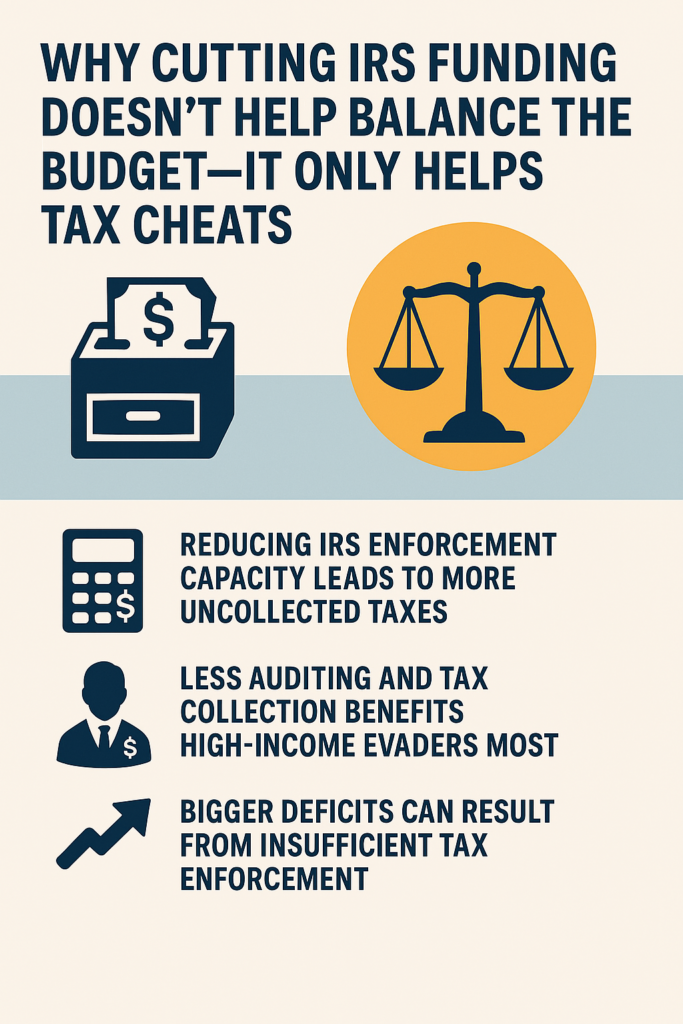
The Importance of Ethics and Compliance in Tax Preparation
Ethical tax preparation ensures fair contribution to public services, reducing fraud and economic inequality. It upholds the integrity of financial reporting and prevents legal consequences.
At 49th Parallel Wealth Management, we are all about ethics, fair markets, and compliance. We believe tax returns are prepared correctly only when tax liability has been mitigated as much as possible while remaining compliant. Not paying your taxes is illegal and is no different than stealing from your fellow citizens.
The Issue with Cutting IRS Funding
What happens when the IRS faces budget cuts?
Reduced IRS funding weakens enforcement, leading to higher tax evasion rates. It decreases audit capacity, delays refunds, and limits taxpayer assistance programs.
Who benefits from IRS budget cuts?
Wealthy tax cheats and corporations with aggressive tax avoidance strategies benefit. Lower IRS oversight allows them to exploit loopholes and evade taxes.
How do IRS budget cuts affect honest taxpayers?
Honest taxpayers face delayed refunds, reduced customer service, and an increased tax burden due to revenue shortfalls. The tax gap—the difference between taxes owed and paid—widens, shifting costs onto compliant taxpayers.
Let’s talk about something that doesn’t make the headlines nearly enough: IRS funding and the real consequences of gutting it. Most politicians say they want to balance the budget. We agree that the federal government should work toward a balanced budget. Fiscal responsibility is important. But then in the same breath, the politicians turn around and say we should cut funding to the IRS. That’s where the logic starts to unravel. The IRS is now expecting a $500,000,000,000 drop in revenue due to the DOGE layoffs. This is a drop of as much as 10%.
Why Additional IRS Funding is a Smart Investment
How does increased IRS funding improve tax compliance?
A well-funded IRS enhances enforcement, increases audits of high-income earners, and closes loopholes. It deters tax evasion and improves voluntary compliance rates.
What is the return on investment (ROI) for IRS funding?
According to the Congressional Budget Office (CBO), every $1 invested in IRS enforcement yields $4 in recovered revenue. This ROI demonstrates the cost-effectiveness of tax enforcement initiatives.
How does increased IRS funding support small businesses?
More funding improves customer service, simplifies tax filing, and gives businesses better guidance on deductions and credits. It reduces administrative burdens and prevents small businesses from facing disproportionate scrutiny.
The Reality of IRS Enforcement
But here’s what really frustrates me: people have this Hollywood idea that IRS agents are busting down doors, guns blazing. That’s not reality. If the IRS thinks there’s a problem with your return, they’ll send you a letter. Then maybe another. Most issues get resolved through regular mail or over the phone. To get to the point where agents show up at your door, you have to be doing something really egregious—and you have to be completely uncooperative over a long period of time.
If you’re just someone who made a mistake or left something out accidentally, the system gives you plenty of time and opportunity to fix it. The idea that IRS agents are out to get regular folks is just not true.
How Underfunding the IRS Affects Audits
What does happen when the IRS is underfunded is this: audits go up for lower-income taxpayers and down for the wealthy. Why? Because complex audits, like those involving high-net-worth individuals, corporations, or international tax issues, require experienced, highly trained agents. And guess what? Those agents cost more. When companies and agencies downsize, the expensive positions make the biggest difference. When you don’t fund the IRS, they don’t have the resources to go after the big fish. So instead, they focus on simpler returns, the ones from people who claim the Earned Income Tax Credit, have a home office, or have a basic W-2 and 1099 income.
Meanwhile, wealthy people with complicated returns and offshore accounts slide right through.
The Negative Impact of Reduced IRS Funding on Tax Compliance
Worse still, when IRS funding drops, tax cheating actually increases. There’s a deterrent effect when people know the IRS is watching. After all, we are on the trust system for tax compliance unless you get audited. And when enforcement drops off, people take chances. That tendency is especially true of the ultra-wealthy, the folks with the most to gain from hiding income or bending the rules.
That’s why this whole “we want to cut IRS funding to help balance the budget” thing is just political theater. It’s backwards. It’s not about helping you. It’s about making sure wealthy donors can play by a different set of rules.
And let’s not forget: Congress and the president are the ones who make tax laws, not the IRS. The IRS just enforces what’s already on the books. So, if you don’t like the tax code, don’t blame the IRS. Blame the folks who passed the laws.
Now, could the IRS use better technology and fewer unnecessary audits? Sure. With better funding, they could invest in systems that avoid auditing people when there are no mistakes and where the audit would result in no new taxes being owed. That’s the kind of improvement we should all support, efficiency, accuracy, and fairness.
But cutting their funding? That only makes the system worse for everyone except the people who are already gaming it.
So, don’t believe people who say that cutting IRS funding is about balancing the budget. If you’re serious about reducing the deficit, one of the smartest moves you can make is fully funding the IRS. If you don’t want the IRS auditing law-abiding citizens, fully fund the IRS so they can improve their technology and have the resources and expertise to go after the real tax cheats. Otherwise, we’re letting the cheaters win.




